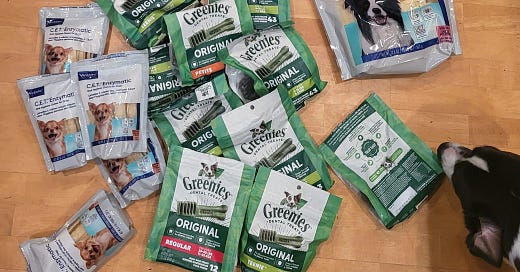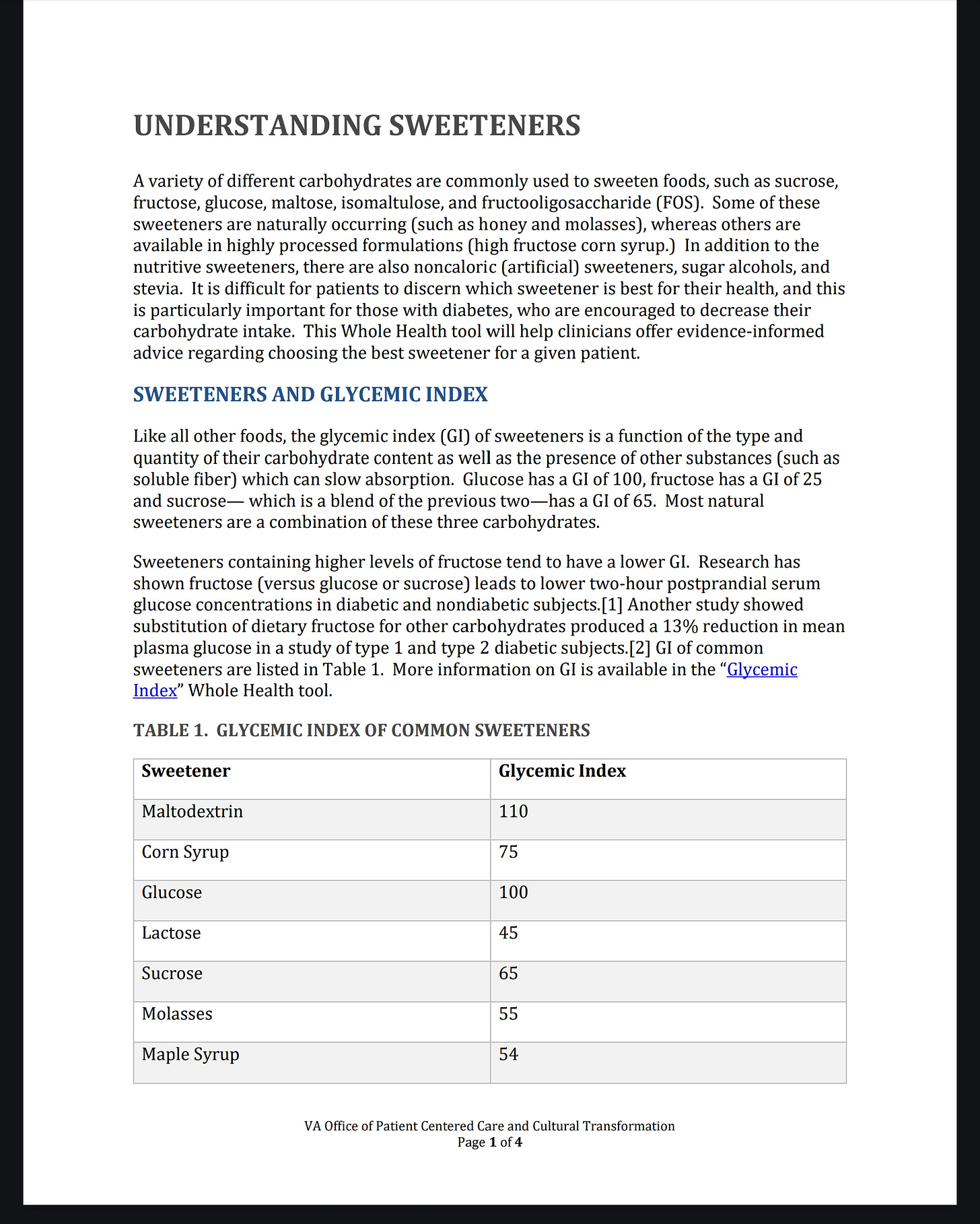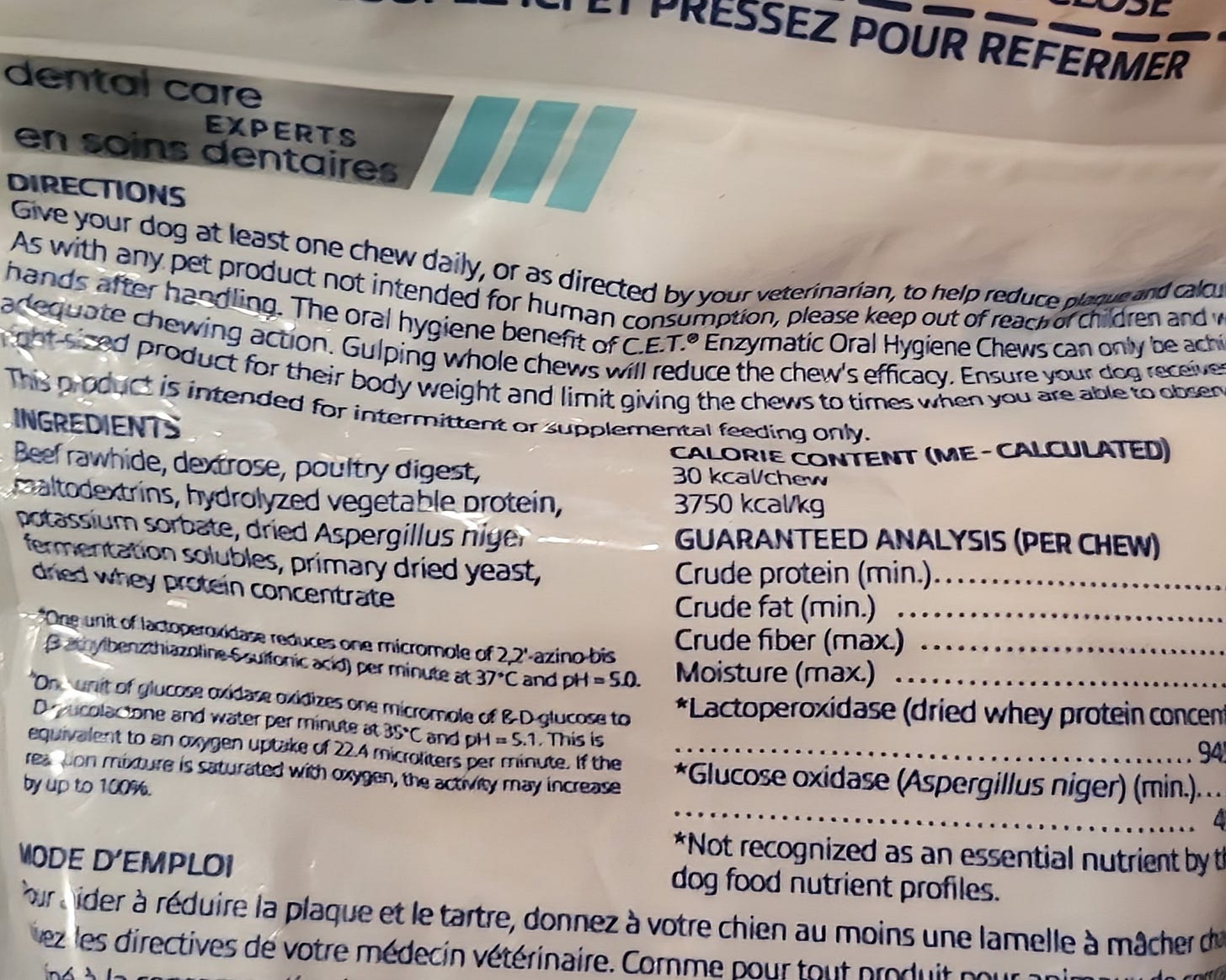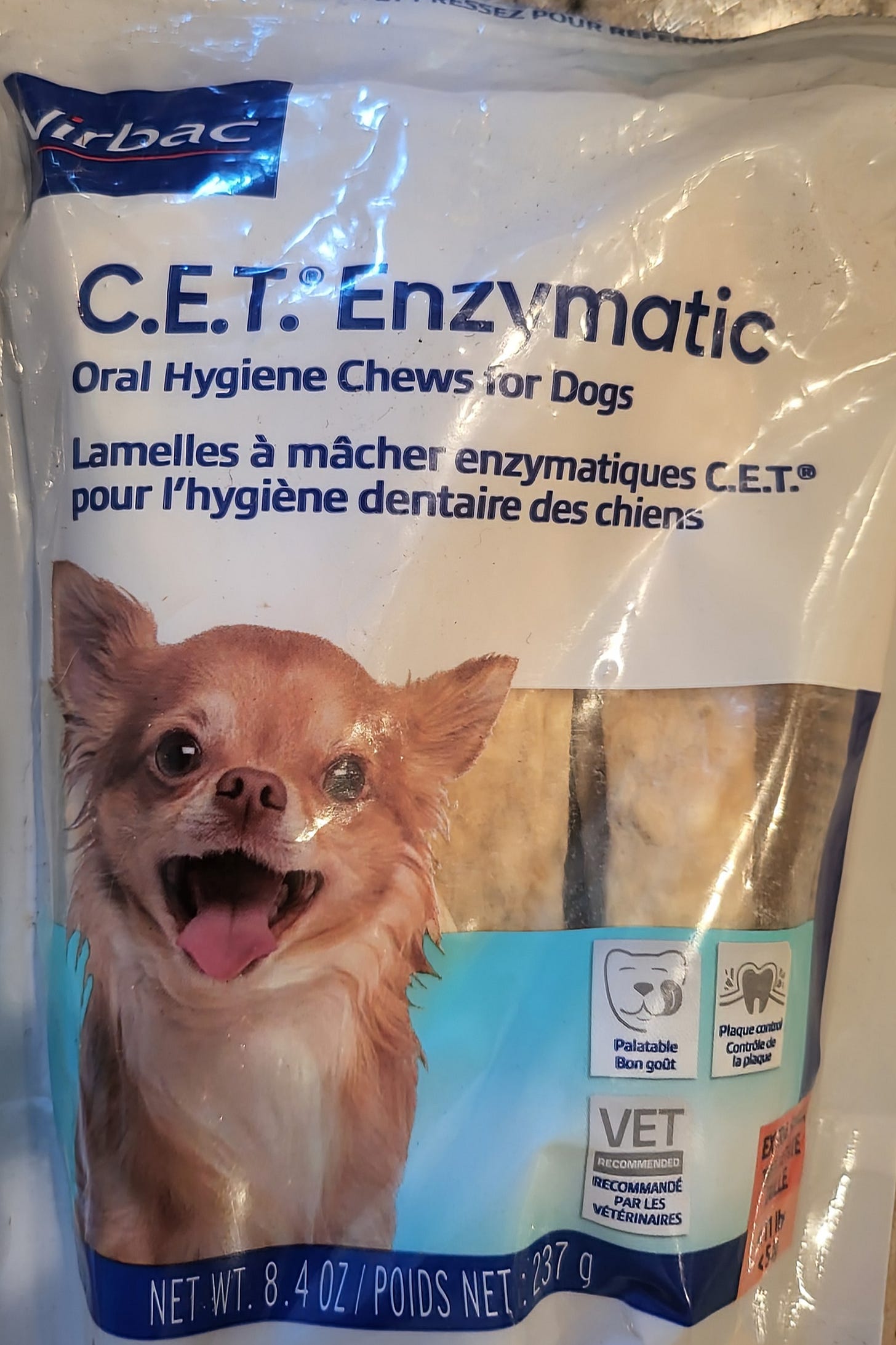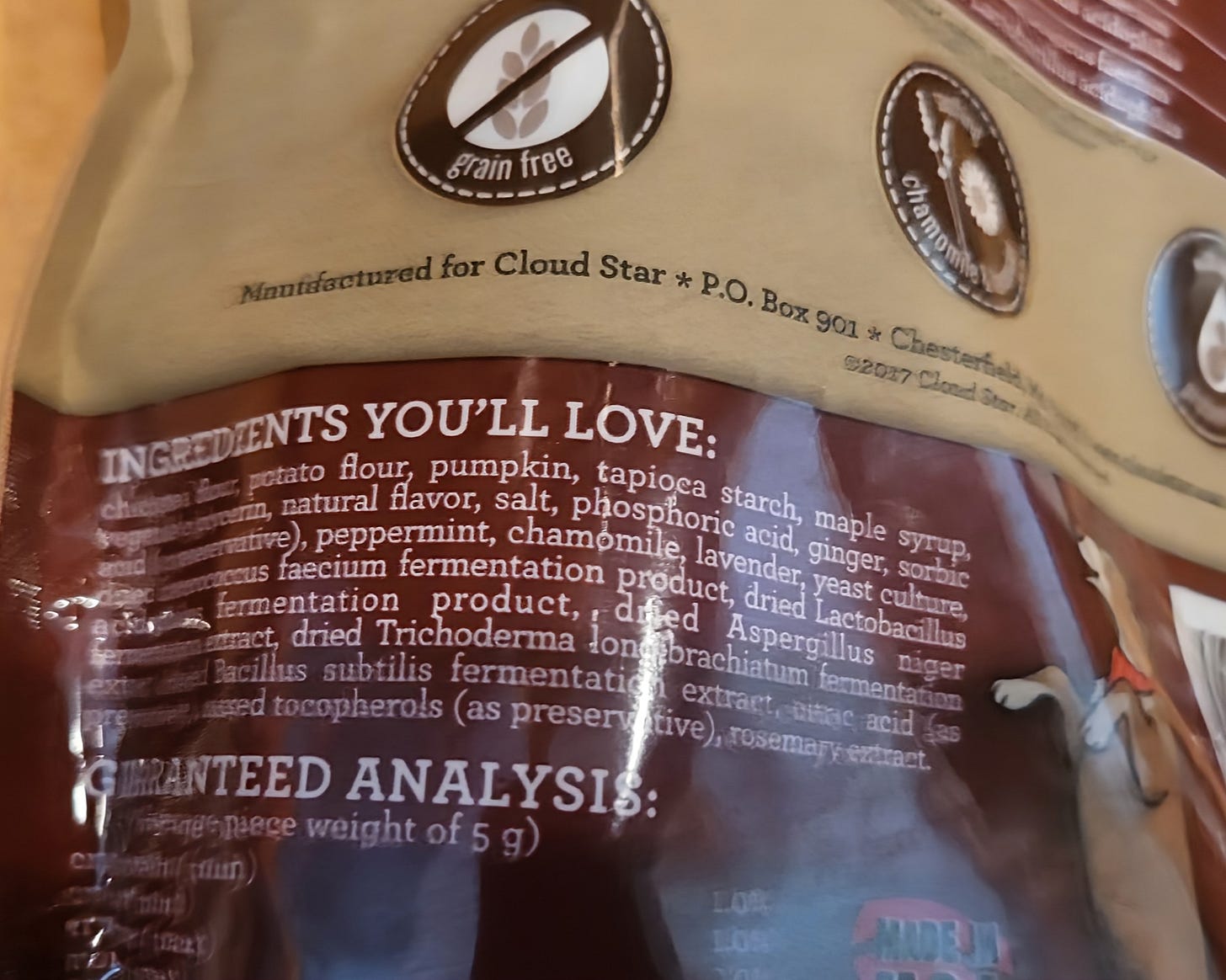Pet Food: Sweetners, Diabetes, and Cancer
Preventable, but why are these ingredients allowed to begin with?
Did you realize modern pets also suffer from Diabetes?
Did you take a look at the ingredients of the foods you buy for your pets?
On what planet should pets ever be at risk of suffering from Diabetes? It's totally insane if we stop and think about what we 'should be' feeding pets, and then look at what's actually in the ingredients of what we feed them.
Everyone one of this pictured have unhealthy ingredients which can drive up blood sugar. In particular, Greenies have practically nothing healthy in them, for $17 per bag. Virbac C.E.T. Enymatic Oral Hygeine Care products have Dextrose and Maltodextrins. Maltodextrin is 60% MORE Glycemic than Sugar. Royal Canin, an expensive brand, is the least bad, but chicken by-product meal is a primary ingredient alongside a few other low quality food ingredients. Dynanmo Dog would be amazing, except for the potato flour, maple syrup, and tapioca starch. Yes, these are treats, but since their marketing positions then as Healthy Treats, owners will dispense much more often than other less healthy treats. Would you feed your dog a slice of white bread? No. So why would we feed them other products with higher glycemic (GI) components?
Ingredient labels are provided at the foot of this post. Substack “photo albums” is broken, otherwise I would have put them all here.
Apparently, we pet owners either don't read the ingredients, are ignorant of the dangers, or simply don't care.
Maybe we'll care when our pet suffers for a few years, dies early, and we get slapped with huge vet bills trying to save them after it's already way too late.
Maybe then? “Most Folks” probably not, even then.
This is NOT #RocketScience
Diabetes damages Metabolic & Mitochondrial Health.
Insulin Resistance drives onset and episodes of Diabetes.
Blood Sugar drives Insulin Resistance.
Glycemic Index of the foods we eat impact Blood Sugar.
Our Diet’s Glycemic Index Profile is the Primary Risk Driver of Diabetes.
Intentionally Oversimplified so normal folks can grasp the Big Picture.
Solution? Reducing our intake of high glycemic foods reduces our danger of becoming Type2 Diabetic, or exacerbating Type1.
100% Preventable? Type2? Pretty much.
I going to be salty and just say it Type2 Diabetes is a disease bourne of ignorance, or even apathy, and then eventually also driven by the actual addiction to “sugar spikes”.
I have been guilty of it for years until my lab work numbers made me look at the situation. I have been hovering at 5.9 for 8 years now, teetering right ght on the edge. Not one healthcare professional told me anything about any of this other than reduce booze, candy, and cake. Not a word about all the other glycemic inputs.
It's almost as if they wanted me to ‘upgrade’ my medical plan to ‘Diabetic Status’. Hmm. No, that couldn't be right, could it? Not one person on healthcare will make any more money on me when I eventually become chronically, permanently, and probably irreversibly sick.
Right? Ha.
At the end of the day, Mea Culpa Maxima.
It's 💯% my own dang fault.
This information has been out there all along, since at least the 1990s.
I chose not to look at it.
I'm just lucky I took notice in a nick of time, before it was too late.
CANCER and Sugars
And then there's Glycemics Relationship To Cancer: “... Carbohydrates, in particular simple sugars are often accused of ‘feeding cancer cells’. This type of generalization may be appealing for those seeking alternative cancer therapies or the tabloid newspapers but they oversimplify a highly complex area.” Here's the complex issues, but the simpleton version.. yep, high GI foods can drive cancer, not always, but it's on the list to keep an eye on.
https://www.elmoskitchen.com/dog-nutritionist/do-carbohydrates-feed-my-dogs-cancer/
If we don't care enough about our own health to examine ingredients, then perhaps we'll actually care about our pet's health?
(After all, while I may not remember your name, I will nearly always remember your pet's name. 😎 #PetsRule!)
How do we kkow what not to buy? For human products, including makeup and shampoos, the "Yuka" app (https://yuka.io) makes this a breeze. Scan your non-dairy creamer if your want a spooky wake-up call stronger than your actual coffee. There's scary stuff in the creamers.
Sadly, Yuka does not yet scan pet products, but if you prepare your pet's meals with “hooman” food like I do, this can screen out the bad products for you and your pet. Yuka works for us since we only feed kibble “pet food” when traveling.
Just browsing the pet foods in a regular grocery store, nearly ALL pet treats are essentially high glycemic 'candy' full of starch, carbs, and sweeteners, Newman's Own and Blue Buffalo (although not organic) being some of the only major exceptions to this deplorable situation.
https://www.onlynaturalpet.com/collections/newmans-own-organics
A high end pet food store should have healthier products, right? Stella and Chewy usually does a good job, but read all the ingredient labels.
Consider: If our vet cares genuinely cares for our pet, shouldn't the Vet advising us of this situation? Shouldn't our own human doctor do the same for our own health? When is the last time your vet or doc had a chat with you about how to read the labels to prevent these ingredients from contaminating your pet's food and our own human food?
These are unhealthy toxins, therefore yes.. ‘contaminants’ is the correct word.
Think about it. Why do Health Food Stores even exist? What are they selling in a regular grocery store which allows a Health Food Store to service their market niche? Grocery stores sell mostly unhealthy garbage packaged and branded as “food”.
As for humans, it's a similar issue. These very same ingredients degrade human metabolic and mitochondrial health.
One major thing to watch for is Maltodextrin. As stated above, Maltodextrin is 60% MORE glycemic than granulated sugar, not legally labeled as “sugar”, and used as a primary ingredient in sweeteners labeled "Suitable for Diabetics" or "Zero Sugar".
Read more:
https://open.substack.com/pub/ardentlygrant/p/maltodextrin-sweetners-a-threat-to
Maltodextrin is in Veterinary sold pet products, such as Virbac. Ask your own Vet why they think it's safe to sell High GI pet chews.
Attached below, you will find an excellent and simple document to understand and navigate Glycemic ingredients in foods.
Published by the VA Office Of Patient Centered Care and Cultural Transformation, the chart is very useful to keep on your phone when you're out shopping for you and your pets. Obviously, pets have no business eating sweetened products with high glycemic index profiles, but many expensive pet supplements, treats, and foods contain all kinds of carbs & sweeteners, such as agave, maple, or cane syrup, tapioca, rice & potato based ingredients, molasses. Fructoologosaccharide is an exception, a prebiotic not digested by the small intestine which feeds beneficial gut flora
Dive deep into all of these and more:
https://www.va.gov/WHOLEHEALTHLIBRARY/tools/glycemic-index.asp
Please also Review Related articles on ArdentlyGrant’s Substack:
https://open.substack.com/pub/ardentlygrant/p/everyday-toxins
https://open.substack.com/pub/ardentlygrant/p/sugar-coated-pet-treats-and-mercury
https://open.substack.com/pub/ardentlygrant/p/gmo-bbq-pork
https://open.substack.com/pub/ardentlygrant/p/feeding-and-caring-for-your-dog
Canadian Veterinarian Dr. Andrew Jones has some amazing articles, especially dealing with pet cancers. He intentionally resigned from active veterinary practice so he could continue providing this information. He’s a brave hero. He has amazing pet meal planning tips in the book, in addtion to tons of homeopathic first aid, flee-tick management, wound care, and so on.
https://veterinarysecrets.com/9-natural-kitchen-remedies-to-improve-your-dogs-health

